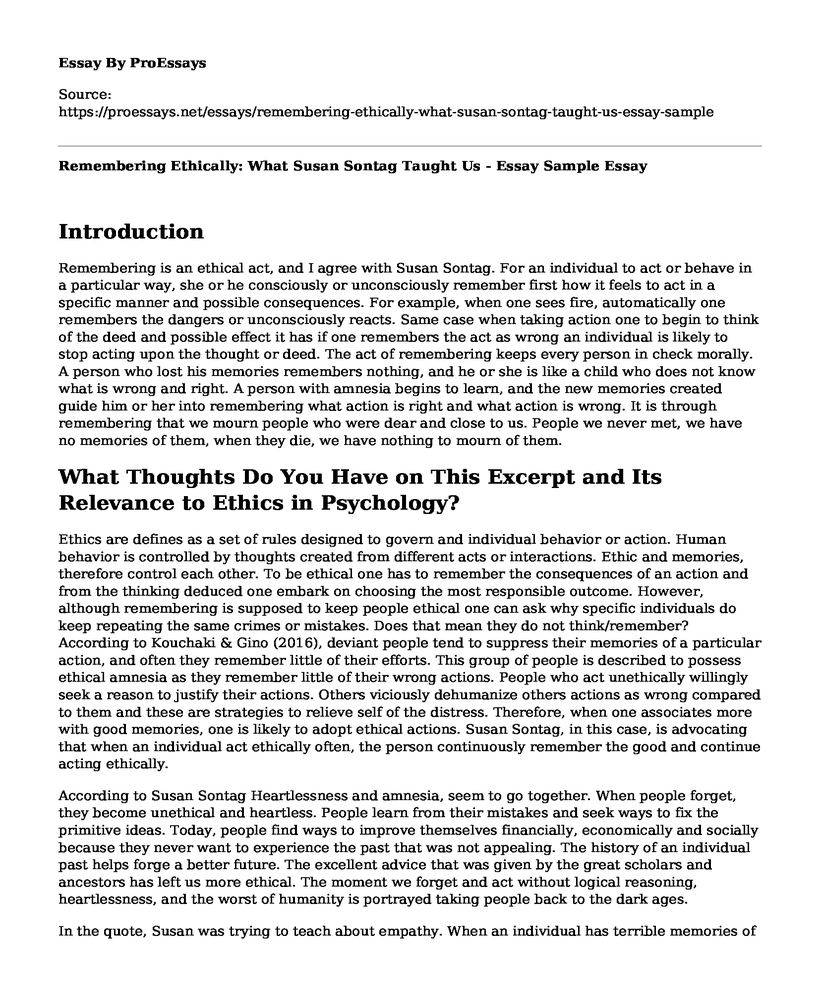Introduction
Remembering is an ethical act, and I agree with Susan Sontag. For an individual to act or behave in a particular way, she or he consciously or unconsciously remember first how it feels to act in a specific manner and possible consequences. For example, when one sees fire, automatically one remembers the dangers or unconsciously reacts. Same case when taking action one to begin to think of the deed and possible effect it has if one remembers the act as wrong an individual is likely to stop acting upon the thought or deed. The act of remembering keeps every person in check morally. A person who lost his memories remembers nothing, and he or she is like a child who does not know what is wrong and right. A person with amnesia begins to learn, and the new memories created guide him or her into remembering what action is right and what action is wrong. It is through remembering that we mourn people who were dear and close to us. People we never met, we have no memories of them, when they die, we have nothing to mourn of them.
What Thoughts Do You Have on This Excerpt and Its Relevance to Ethics in Psychology?
Ethics are defines as a set of rules designed to govern and individual behavior or action. Human behavior is controlled by thoughts created from different acts or interactions. Ethic and memories, therefore control each other. To be ethical one has to remember the consequences of an action and from the thinking deduced one embark on choosing the most responsible outcome. However, although remembering is supposed to keep people ethical one can ask why specific individuals do keep repeating the same crimes or mistakes. Does that mean they do not think/remember? According to Kouchaki & Gino (2016), deviant people tend to suppress their memories of a particular action, and often they remember little of their efforts. This group of people is described to possess ethical amnesia as they remember little of their wrong actions. People who act unethically willingly seek a reason to justify their actions. Others viciously dehumanize others actions as wrong compared to them and these are strategies to relieve self of the distress. Therefore, when one associates more with good memories, one is likely to adopt ethical actions. Susan Sontag, in this case, is advocating that when an individual act ethically often, the person continuously remember the good and continue acting ethically.
According to Susan Sontag Heartlessness and amnesia, seem to go together. When people forget, they become unethical and heartless. People learn from their mistakes and seek ways to fix the primitive ideas. Today, people find ways to improve themselves financially, economically and socially because they never want to experience the past that was not appealing. The history of an individual past helps forge a better future. The excellent advice that was given by the great scholars and ancestors has left us more ethical. The moment we forget and act without logical reasoning, heartlessness, and the worst of humanity is portrayed taking people back to the dark ages.
In the quote, Susan was trying to teach about empathy. When an individual has terrible memories of an era they can choose to suppress the actions of that time, others try to do good so that such acts never happen to another or else they seek revenge by doing evil to others. How an individual remembers of an action one decided what ethical decision to take. Developing empathy, however, place an individual in a situation to understand. Remembering moments when things were bad, a person remember the nightmare and understand what others are going through. If an individual fails to recognise and associate with the events, then heartlessness and selfishness prevail.
References
Sontag, S. (2003). Regarding the pain of others. Diogene, (1), 127-139.
Kouchaki, M., & Gino, F. (2016). Memories of unethical actions become obfuscated over time. Proceedings of the National Academy of Sciences, 113(22), 6166-6171.
Cite this page
Remembering Ethically: What Susan Sontag Taught Us - Essay Sample. (2023, May 01). Retrieved from https://proessays.net/essays/remembering-ethically-what-susan-sontag-taught-us-essay-sample
If you are the original author of this essay and no longer wish to have it published on the ProEssays website, please click below to request its removal:
- Essay Sample on Bipolar Affective Disorder
- Research Paper on Stress Reducing
- Physiological Mechanism Underlying the Stress Symptoms Essay Example
- Essay Example on Etiquette: The Social Rules of Harmonious Interactions
- Essay Sample on My Little Sister & Me: Love & Affection Beyond the Norm
- Essay Example on Mental Wellness in New Motherhood: Pregnancy, Birth & Beyond
- Essay on Navigating a New Environment: My Struggles With Low GPA and Academic Probation







